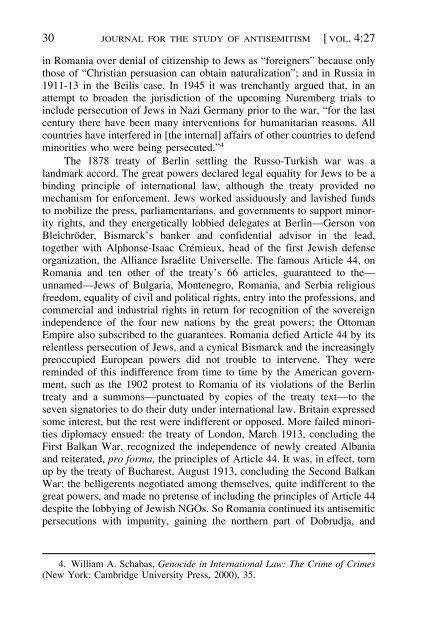Volume 4 No 1 - Journal for the Study of Antisemitism
Volume 4 No 1 - Journal for the Study of Antisemitism
Volume 4 No 1 - Journal for the Study of Antisemitism
You also want an ePaper? Increase the reach of your titles
YUMPU automatically turns print PDFs into web optimized ePapers that Google loves.
30 JOURNAL FOR THE STUDY OF ANTISEMITISM [ VOL. 4:27<br />
in Romania over denial <strong>of</strong> citizenship to Jews as “<strong>for</strong>eigners” because only<br />
those <strong>of</strong> “Christian persuasion can obtain naturalization”; and in Russia in<br />
1911-13 in <strong>the</strong> Beilis case. In 1945 it was trenchantly argued that, in an<br />
attempt to broaden <strong>the</strong> jurisdiction <strong>of</strong> <strong>the</strong> upcoming Nuremberg trials to<br />
include persecution <strong>of</strong> Jews in Nazi Germany prior to <strong>the</strong> war, “<strong>for</strong> <strong>the</strong> last<br />
century <strong>the</strong>re have been many interventions <strong>for</strong> humanitarian reasons. All<br />
countries have interfered in [<strong>the</strong> internal] affairs <strong>of</strong> o<strong>the</strong>r countries to defend<br />
minorities who were being persecuted.” 4<br />
The 1878 treaty <strong>of</strong> Berlin settling <strong>the</strong> Russo-Turkish war was a<br />
landmark accord. The great powers declared legal equality <strong>for</strong> Jews to be a<br />
binding principle <strong>of</strong> international law, although <strong>the</strong> treaty provided no<br />
mechanism <strong>for</strong> en<strong>for</strong>cement. Jews worked assiduously and lavished funds<br />
to mobilize <strong>the</strong> press, parliamentarians, and governments to support minority<br />
rights, and <strong>the</strong>y energetically lobbied delegates at Berlin—Gerson von<br />
Bleichröder, Bismarck’s banker and confidential advisor in <strong>the</strong> lead,<br />
toge<strong>the</strong>r with Alphonse-Isaac Crémieux, head <strong>of</strong> <strong>the</strong> first Jewish defense<br />
organization, <strong>the</strong> Alliance Israélite Universelle. The famous Article 44, on<br />
Romania and ten o<strong>the</strong>r <strong>of</strong> <strong>the</strong> treaty’s 66 articles, guaranteed to <strong>the</strong>—<br />
unnamed—Jews <strong>of</strong> Bulgaria, Montenegro, Romania, and Serbia religious<br />
freedom, equality <strong>of</strong> civil and political rights, entry into <strong>the</strong> pr<strong>of</strong>essions, and<br />
commercial and industrial rights in return <strong>for</strong> recognition <strong>of</strong> <strong>the</strong> sovereign<br />
independence <strong>of</strong> <strong>the</strong> four new nations by <strong>the</strong> great powers; <strong>the</strong> Ottoman<br />
Empire also subscribed to <strong>the</strong> guarantees. Romania defied Article 44 by its<br />
relentless persecution <strong>of</strong> Jews, and a cynical Bismarck and <strong>the</strong> increasingly<br />
preoccupied European powers did not trouble to intervene. They were<br />
reminded <strong>of</strong> this indifference from time to time by <strong>the</strong> American government,<br />
such as <strong>the</strong> 1902 protest to Romania <strong>of</strong> its violations <strong>of</strong> <strong>the</strong> Berlin<br />
treaty and a summons—punctuated by copies <strong>of</strong> <strong>the</strong> treaty text—to <strong>the</strong><br />
seven signatories to do <strong>the</strong>ir duty under international law. Britain expressed<br />
some interest, but <strong>the</strong> rest were indifferent or opposed. More failed minorities<br />
diplomacy ensued: <strong>the</strong> treaty <strong>of</strong> London, March 1913, concluding <strong>the</strong><br />
First Balkan War, recognized <strong>the</strong> independence <strong>of</strong> newly created Albania<br />
and reiterated, pro <strong>for</strong>ma, <strong>the</strong> principles <strong>of</strong> Article 44. It was, in effect, torn<br />
up by <strong>the</strong> treaty <strong>of</strong> Bucharest, August 1913, concluding <strong>the</strong> Second Balkan<br />
War; <strong>the</strong> belligerents negotiated among <strong>the</strong>mselves, quite indifferent to <strong>the</strong><br />
great powers, and made no pretense <strong>of</strong> including <strong>the</strong> principles <strong>of</strong> Article 44<br />
despite <strong>the</strong> lobbying <strong>of</strong> Jewish NGOs. So Romania continued its antisemitic<br />
persecutions with impunity, gaining <strong>the</strong> nor<strong>the</strong>rn part <strong>of</strong> Dobrudja, and<br />
4. William A. Schabas, Genocide in International Law: The Crime <strong>of</strong> Crimes<br />
(New York: Cambridge University Press, 2000), 35.














